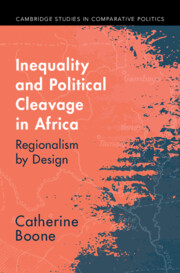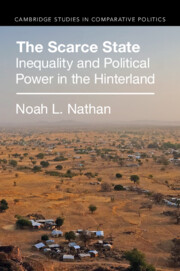42 results
6 - Territorial Oppositions in African Politics
-
- Book:
- Inequality and Political Cleavage in Africa
- Published online:
- 18 April 2024
- Print publication:
- 25 April 2024, pp 168-194
-
- Chapter
- Export citation
8 - Conclusion
-
- Book:
- Inequality and Political Cleavage in Africa
- Published online:
- 18 April 2024
- Print publication:
- 25 April 2024, pp 223-242
-
- Chapter
- Export citation
7 - Regionalism and the National Agenda
-
- Book:
- Inequality and Political Cleavage in Africa
- Published online:
- 18 April 2024
- Print publication:
- 25 April 2024, pp 195-222
-
- Chapter
- Export citation
5 - Regional Hierarchies and Winning Coalitions
-
- Book:
- Inequality and Political Cleavage in Africa
- Published online:
- 18 April 2024
- Print publication:
- 25 April 2024, pp 149-167
-
- Chapter
- Export citation
2 - Region and Regionalism in African Politics
-
- Book:
- Inequality and Political Cleavage in Africa
- Published online:
- 18 April 2024
- Print publication:
- 25 April 2024, pp 25-47
-
- Chapter
- Export citation
1 - Economic Inequalities and Territorial Oppositions in African Politics
-
- Book:
- Inequality and Political Cleavage in Africa
- Published online:
- 18 April 2024
- Print publication:
- 25 April 2024, pp 1-24
-
- Chapter
- Export citation
4 - Regional Blocs and Bloc Voting in National Elections
-
-
- Book:
- Inequality and Political Cleavage in Africa
- Published online:
- 18 April 2024
- Print publication:
- 25 April 2024, pp 90-148
-
- Chapter
- Export citation
3 - Endowment, Institutions, and Spatial Inequality
-
- Book:
- Inequality and Political Cleavage in Africa
- Published online:
- 18 April 2024
- Print publication:
- 25 April 2024, pp 48-89
-
- Chapter
- Export citation

Inequality and Political Cleavage in Africa
- Regionalism by Design
-
- Published online:
- 18 April 2024
- Print publication:
- 25 April 2024
12 - The Shah’s Fight for Hegemony
- from Part IV - A Troubled Middle East (1960–1979)
-
- Book:
- Heroes to Hostages
- Published online:
- 03 August 2023
- Print publication:
- 24 August 2023, pp 289-312
-
- Chapter
- Export citation
When does education increase political participation? Evidence from Senegal
-
- Journal:
- Political Science Research and Methods / Volume 12 / Issue 2 / April 2024
- Published online by Cambridge University Press:
- 23 August 2023, pp. 354-371
-
- Article
-
- You have access
- Open access
- HTML
- Export citation
Political party ideology in Zambia: comparing the PF and the UPND on social welfare policies
-
- Journal:
- The Journal of Modern African Studies / Volume 61 / Issue 3 / September 2023
- Published online by Cambridge University Press:
- 10 August 2023, pp. 323-342
- Print publication:
- September 2023
-
- Article
-
- You have access
- Open access
- HTML
- Export citation
The messy practice of decolonising a concept: Everyday humanitarianism in Tanzania
-
- Journal:
- Review of International Studies / Volume 49 / Issue 3 / July 2023
- Published online by Cambridge University Press:
- 05 July 2023, pp. 390-403
- Print publication:
- July 2023
-
- Article
-
- You have access
- Open access
- HTML
- Export citation
Oil discoveries and political windfalls: evidence on presidential support in Uganda
-
- Journal:
- Political Science Research and Methods / Volume 11 / Issue 4 / October 2023
- Published online by Cambridge University Press:
- 07 June 2023, pp. 903-912
-
- Article
-
- You have access
- Open access
- HTML
- Export citation
6 - Socially Embedded Good Governance
-
- Book:
- Good Governance in Nigeria
- Published online:
- 13 April 2023
- Print publication:
- 20 April 2023, pp 234-261
-
- Chapter
- Export citation
Introduction
-
- Book:
- Good Governance in Nigeria
- Published online:
- 13 April 2023
- Print publication:
- 20 April 2023, pp 1-57
-
- Chapter
- Export citation
2 - The Large Effects of Scarce States
-
- Book:
- The Scarce State
- Published online:
- 23 February 2023
- Print publication:
- 02 March 2023, pp 37-58
-
- Chapter
- Export citation
1 - The Politics of State Scarcity
-
- Book:
- The Scarce State
- Published online:
- 23 February 2023
- Print publication:
- 02 March 2023, pp 3-36
-
- Chapter
- Export citation

The Scarce State
- Inequality and Political Power in the Hinterland
-
- Published online:
- 23 February 2023
- Print publication:
- 02 March 2023
1 - Running against All Odds
-
- Book:
- Activist Origins of Political Ambition
- Published online:
- 08 July 2022
- Print publication:
- 21 July 2022, pp 1-34
-
- Chapter
- Export citation

